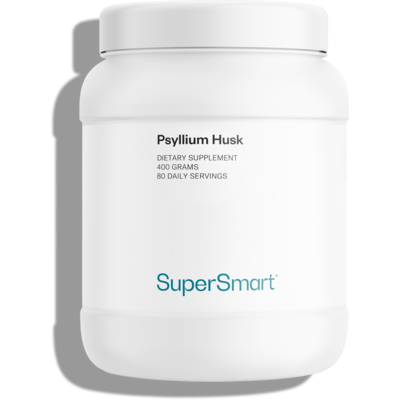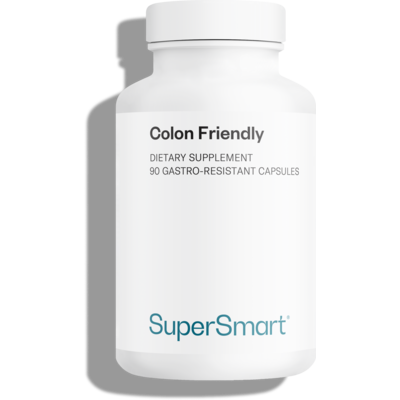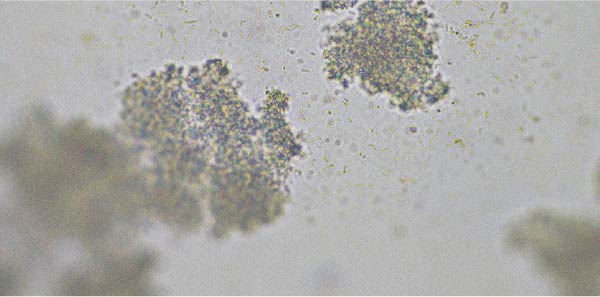How long does it take to digest food?
Want to know if your digestive issues are related to the last meal you ate? Discover the various stages of digestion, how long they last, and the point at which the most common problems usually appear.

Definition of digestion and total duration
The role of digestion is clear: to convert food into nutrients that can be absorbed by the body. Food is the material needed for the creation of living organisms (repair, growth, maintenance) and the production of energy reserves. Its conversion takes place in a 5 metre-long tube, the digestive tract, supported by auxiliary digestive organs including the liver, pancreas and saliva glands.
Digestion is a complex process which can last in total between 30 and 120 hours depending on the individual, age, type of food ingested and any potential diseases (1). But let’s first take a closer look at the duration of each stage, and then the point at which the most common digestive issues usually occur following a meal.
The 3 key stages of digestion and their duration
First stage of digestion in the stomach
After briefly passing through the mouth and oesophagus, food reaches the stomach, the first dilated part of the digestive tract. There it is converted into a kind of pulpy mass called chyme, as a result of powerful muscle contractions and the acidity of gastric juice.
The lower part of the stomach then acts as a filter, allowing only the smallest particles and liquids to pass through to the small intestine. Everything else continues to be crushed and kneaded until it reaches the required size.
Liquids usually remain in the stomach for less than 30 minutes unless they are complex (smoothies, protein milks …), and cooked vegetables for just 30-45 minutes, as opposed to 5 hours+ for a portion of meat. Generally speaking, solid and complex foods take between 3 and 7 hours to pass through the stomach (1).
A key stage in the small intestine
When it reaches the small intestine, the main site of digestion, the crushed food is only partially digested. The fats have not yet undergone any transformation. Under the effects of new muscle contractions, the pulp spends 3 to 6 hours travelling to the end of the small intestine.
The process of chemical digestion of food intensifies as it progresses: numerous secretions, such as bile and pancreatic juice, break down the chyme, while the nutrients released cross the intestinal barrier to reach the bloodstream.
Final stage of digestion: the colon
The undigested material then passes into the large intestine which includes the colon. It has two main roles: to absorb water from the remaining residues to compact them into stools and to store them before their elimination via the anus. However, it is home to a fascinating ecosystem, populated with billions of micro-organisms and capable of re-processing previously indigestible compounds, such as dietary fibre. This ecosystem, thought to weigh less than a kilogram, is the gut microbiota, with roles in nutrient absorption and protection of the digestive system which are becoming increasingly well-understood.
This final, longer stage lasts around 30 hours on average, but can last a few days. A distinctive feature in humans is that the colon does not contract during the night – it ‘sleeps’ at the same time as the brain (2).
The most common digestive problems and their onset in relation to a meal
Food poisoning
In the case of food poisoning, the food involved is usually contaminated by bacteria, the most common of which include salmonella, E. coli and listeria.
The effects of food poisoning can be felt very quickly: usually after just a few hours, or sometimes even less than an hour after eating the offending food. The length of time it takes for symptoms to appear varies according to which particular contaminated food was eaten, and how much. For example, food poisoning by Clostridium perfringens causes diarrhoea very quickly, as soon as the bacteria reaches the small intestine and releases its toxin.
Flatulence
What about flatulence? Around an hour and 40 minutes after ingestion, the first undigested residues start to reach the colon, triggering the production of gas due to action by the gut microbiota.
This can last for 4 to 6 hours, or even longer when the meal is particularly rich in animal protein. It is often accompanied by discomfort and gurgling noises.
Nausea, feeling over-full and bloating
When a meal reaches the stomach and the upper small intestine, it activates various mechanosensitive fibres and chemical receptors, triggering the release of hormones and digestion-related sensations. In the stomach, excess fat can quickly make you feel unpleasantly over-full.
In those who suffer from acid reflux, dyspepsia and irritable bowel syndrome, it takes significantly less fat consumption for these symptoms to appear (5). Such individuals suffer from hypersensitivity to stimulation of the stomach and small intestine (6-8).
The formulation Anti-Acid Reflux Formula is particularly recommended in the case of acid reflux, while Colon Friendly is more suitable for irritable bowel syndrome.
This hypersensitivity also affects the majority of older people, leading them to leave meals unfinished as the symptoms appear very quickly. In addition to fats, several specific foods and nutrients exacerbate the problem (9): energy-rich foods, dairy products, meat, foods containing wheat or gluten (10), certain plant-source foods (FODMAPS), acidic or irritating foods, spices, coffee and alcohol.
A formulation such as Lectin Flush can help those who suffer from various digestive intolerances. The supplement Glutalytic specifically targets gluten-intolerance.
Constipation
Constipation is the term for when stools move too slowly through the colon (large intestine), resulting in too few bowel movements (less than three a week) and stools that are too hard. It is often accompanied by discomfort in the stomach, cramps and abdominal bloating. Along with diseases, there are several causes: a change in routine, a diet low in fruit and vegetables, too little physical activity …
Increasing your intake of fibre is particularly recommended. Fibre is available in the form of supplements, such as psyllium (Psyllium Husk)
Dysbiosis
Several of the symptoms associated with the above-mentioned problems are also consistent with dysbiosis, an imbalance of the microbiota. It is not usually related to eating a particular meal but to the accumulated effect of many unbalanced meals or repeated, inappropriate use of antibiotics. The problem can be improved by identifying the cause of the imbalance and taking probiotics (such as Probio Forte or Full Spectrum Probiotic Formula).
3 key points to remember about how long digestion takes
- the lower your diet is in fibre - found in raw fruit and vegetables - the longer the transit time in the colon. Dietary fibre increases the number of contractions, ensuring sufficient mixing and progression of contents to the anus;
- complete digestion generally takes longer in women than men;
- metabolism, genetics, use of medication, level of physical activity or day-to-day stress all influence how long the digestive process takes.
SuperSmart ADVICE
References
- Lalau JD. L’estomac, au seuil de la nutrition. In: Aux frontières. Approches 2014; 159:109-20.
- Frexinos et al., 1985
- Jean Fioramonti. Étapes clé du devenir des aliments dans le tube digestif. Innovations Agronomiques, 2014, 36, pp.1-13. ffhal-02629630f
- Mego M., Accarino A., Malagelada J.R., Guarner F., Azpiroz F. Accumulative effect of food residues on intestinal gas production. Motil. 2015;27:1621–1628. doi: 10.1111/nmo.12662.
- Pribic T., Vilaseca H., Nieto A., Hernandez L., Monrroy H., Malagelada C., Accarino A., Roca J., Azpiroz F. Meal composition influences postprandial sensations independently of valence and gustation. Neurogastroenterol. Motil. 2018;30:e13337. doi: 10.1111/nmo.13337.
- Enck P., Azpiroz F., Boeckxstaens G., Elsenbruch S., Feinle-Bisset C., Holtmann G., Lackner J.M., Ronkainen J., Schemann M., Stengel A., et al. Functional dyspepsia. Nat. Rev. Dis. Primers. 2017;3:17081. doi: 10.1038/nrdp.2017.81
- Deane A., Chapman M.J., Fraser R.J., Horowitz M. Bench-to-bedside review: The gut as an endocrine organ in the critically ill. Care. 2010;14:228. doi: 10.1186/cc9039.
- Monteleone P., Castaldo E., Maj M. Neuroendocrine dysregulation of food intake in eating disorders. Pept. 2008;149:39–50. doi: 10.1016/j.regpep.2007.10.007.
- Houghton L.A., Mangall Y.F., Dwivedi A., Read N.W. Sensitivity to nutrients in patients with non-ulcer dyspepsia. J. Gastroenterol. Hepatol. 1993;5:109–114. doi: 10.1097/00042737-199302000-00009.
- Santolaria S., Alcedo J., Cuartero B., Diez I., Abascal M., Garcia-Prats M.D., Marigil M., Vera J., Ferrer M., Montoro M. Spectrum of gluten-sensitive enteropathy in patients with dysmotility-like dyspepsia. Hepatol. 2013;36:11–20. doi: 10.1016/j.gastrohep.2012.07.011.
Keywords
1 Days
great products and prices
great products and prices
Marie
7 Days
Easy to navigate site
Easy to navigate site, had what I was searching for, good price. easy order-check out
James Tucker
13 Days
My skin is clearing up nicely!
Pretty good for my skin so far.
Christian
16 Days
The new packaging is excellent
The new packaging is excellent - finally! No more squashed boxes and torn envelopes.
GORAN
16 Days
Great Product
Great Product
Larry Garrett
21 Days
Quick shipping
Quick shipping; good price. No issues!
Mary McCarty
22 Days
Thr product is very good and is helping…
Thr product is very good and is helping me on my health. Then is always on time
LUGO Luz
25 Days
Buying was fine
Buying was fine. I had problems with the website not recognizing my login info, and had to call to get it fixed. Other than that, everything was good.
David S. Clark
25 Days
Your super maca and super ginseng are…phenomenal
Your super maca and super ginseng are phenomenal supplements that compliment each other when taking them together. Fantastic feeling of well-being and lots of mid day energy without the crash.
Keith Mason
28 Days
I have had amazing results with every…
I have had amazing results with every supplement I've purchased. I am extremely satisfied with this company
kirstin Torres
28 Days
Fine products
Fine products . They are on the leading edge of online supplements. The only issue -so far-is they sometime run out of subscription items.
Jason Argos
30 Days
The ordering process is very user…
The ordering process is very user friendly and the products always come in a timely manner.
CARTER Rhonda
32 Days
The price for Dr
The price for Dr. Pero's AC-11 is reasonable and in line with his views. (my former colleague). Keep it pure.
CAMPBELL Clayton
34 Days
Right on every time.
Right on every time.
Arthur Nicholas
37 Days
They are cheaper than everyone else and…
They are cheaper than everyone else and the shipping was fast. Great company.
Patricia Adams









